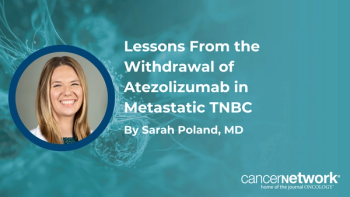
Oncology NEWS International
- Oncology NEWS International Vol 17 No 8
- Volume 17
- Issue 8
Avastin/sunitnib RCC trial closes after serious toxicities
The lead investigator in an evaluation of bevacizumab (Avastin) combined with sunitinib malate (Sutent) for renal cell carcinoma (RCC) said the project would be abandoned. FDA issued a product safety alert after Genentech, Avastin’s developer, reported serious complications in several patients enrolled in the phase I trial.
The lead investigator in an evaluation of bevacizumab (Avastin) combined with sunitinib malate (Sutent) for renal cell carcinoma (RCC) said the project would be abandoned. FDA issued a product safety alert after Genentech, Avastin’s developer, reported serious complications in several patients enrolled in the phase I trial.
“In my opinion, this particular trial is not going to go anywhere in renal cell cancer,” said Robert Motzer, MD, of Memorial Sloan-Kettering Cancer Center.
In its July 14 alert, FDA declared, “Avastin is not approved for use in combination with sunitinib malate, and this combination is not recommended.” The alert was based on a July 11 letter from Genentech to cancer care specialists.
Dr. Motzer told ONI that he was surprised by the complications, which included microangiopathic hemolytic anemia (MAHA) with severe hypertension. Initially, tumor response was excellent, and the full dose was reached without dose-limiting toxicity, he said. But over time, poor tolerance became apparent. All patients who developed MAHA recovered when the drug was terminated.
Poor tolerability that did not involve MAHA led Genentech to close two phase II trials of Avastin/sunitinib in NSCLC and metastatic breast cancer. Genentech spokesperson Kimberly Ocampo said the negative results would not affect the overall Avastin development program.
Dr. Motzer noted that the cases of MAHA in his study were observed in patients who received the highest dose level of sunitinib malate. “One could potentially look at alternative dosing strategies with very low doses or intermittent doses in clinical trials,” he said.
The phase I dose-escalation study involved 25 patients in three cohorts. Five of 12 patients received the highest sunitinib dose, and two of those subjects had severe MAHA.
Dr. Motzer theorized that the drugs may have caused a reaction in the blood vessel lining or that the complications may be unique to RCC patients. The trial marked the first time he had seen MAHA in RCC patients, he said.
Dr. Motzer noted that, despite the disappointing outcome, “this is the way the process is supposed to work. If there is a signal like this, we need to act on it. That’s exactly what we did in a strong fashion.”
Articles in this issue
over 17 years ago
An editor says farewellover 17 years ago
High cost of biologics takes a toll on hem/onc practicesover 17 years ago
FDA mandates changes to ESA labeling infoover 17 years ago
Poll results: Medical education falters on pain reliefover 17 years ago
Certification offered to rad oncs for care of dying patientsover 17 years ago
VA enlists ACR for RT accreditations; H&N date changeover 17 years ago
Erbitux gains expanded approval in Europeover 17 years ago
Docs deserve pay for cognitive skill setover 17 years ago
Creator of Herceptin goes Hollywood in TV biopicover 17 years ago
FDA cracks down on counterfeit cancer cure productsNewsletter
Stay up to date on recent advances in the multidisciplinary approach to cancer.















































